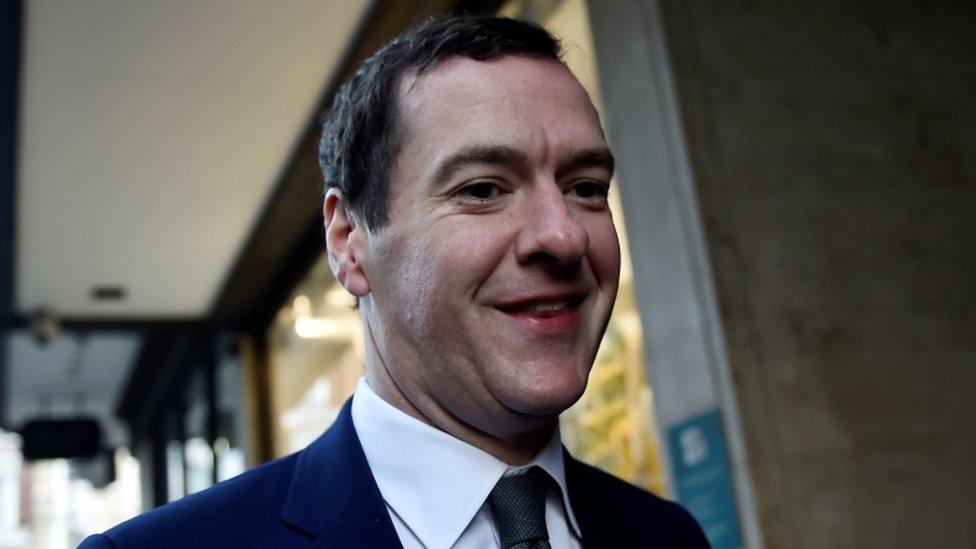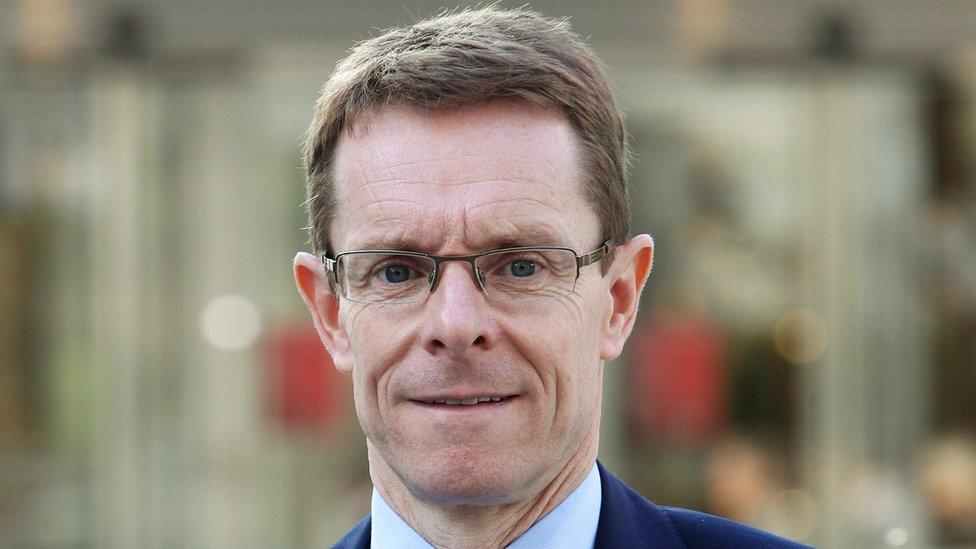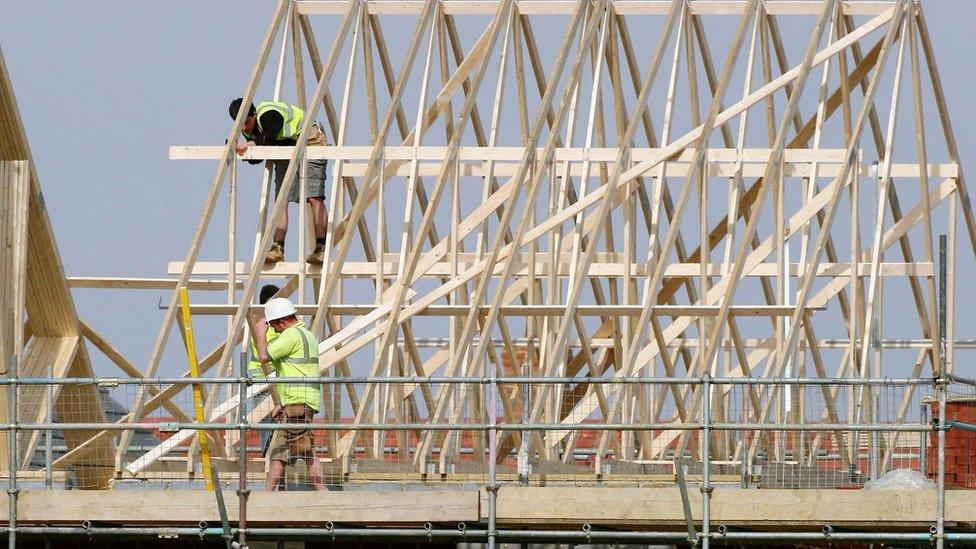Midlands devolution revolution: Now the reality check
- Published

The devolution revolution catchphrase came to define George Osborne's vision of an English version of "devo max".
It doesn't rhyme but it chimes
It's three years now since the then Chancellor George Osborne coined that expression "devolution revolution".
As slogans go, it's always looked better on paper than it's sounded out loud. An omen, perhaps, that his future lay not in the Commons but in the newspaper editor's office.
Whatever its merits or demerits, the catchphrase came to define Mr Osborne's vision of an English version of "devo max".
Those city regions, including the West Midlands, which agreed to establish combined authorities with directly-elected "metro mayors" as focal points for local accountability would be rewarded with extra political and spending powers.
This, he told them, would give them the extra clout they had craved for so long.
Ministers called it localism.

The political honeymoon enjoyed by Conservative metro mayor Andy Street since his election last May has lasted longer than most
More sceptical local politicians in all the main parties remained to be convinced that this would amount to anything more than an unwanted and expensive extra layer of government; a super council some called it.
The government reassured us all that devolution meant downloading money from Whitehall's funding streams, rather than uploading it from those of the town hall.
One reason, perhaps, why the political honeymoon enjoyed by Conservative metro mayor Andy Street since his election last May has lasted longer than most.
Yes, he took some flak over his refusal to intervene in the Birmingham bins dispute; he said during the summer it was a city council responsibility and that was that.
More generally he has been largely immune to criticism.

There is a £200m brown-field remediation fund to clean up contaminated industrial land for house-building
He can now celebrate two devolution deals worth over £1.4bn over 30 years to drive an £8bn investment programme.
A long-term £3.4bn transport strategy will extend the Metro tram network and open, or reopen, suburban rail services.
There is a £200m brown-field remediation fund to clean up 1,600 hectares of contaminated industrial land for much-needed house-building.
His to-do list brings with it an apparently ever-expanding schedule of works in progress.
Public perceptions and precepts

Some form of clean air charging to curb atmospheric pollution by ageing diesel vehicles is on Andy Street's horizon
Now though, with the new year comes the reality check.
Devolution was never going to offer something for nothing.
The agenda for this week's meeting of the West Midlands Combined Authority, which Mr Street chairs, contains confirmation that the mayor's office is asking for an extra £7.5m to be raised across Birmingham, Coventry, Dudley, Sandwell, Solihull, Walsall and Wolverhampton.
Initially we were told this would equate to a draft precept of £12 a year on council tax bills for Band D properties. But by the time the agenda for the WMCA board meeting had been finalised, the figure had been revised down to £10.80, in support of the mayor's proposals, among other things, to cut traffic congestion, introduce new cycle lanes and establish park-and-ride facilities at railway stations.
Council tax rise
Some form of clean air charging to curb atmospheric pollution by ageing diesel cars and commercial vehicles is also on his horizon.
But whatever the justification, we should never forget the fundamental reason why politicians tax people: To raise money.
The same applies to the government's other big venture into the arena of directly-elected quasi-presidential leaders, the five police and crime commissioners who now oversee our five local forces.
Like the Conservative mayor, the Labour commissioner in our biggest local force area also wants an extra £12 precept on top of council tax bills for Band D properties.
The West Midlands' commissioner David Jamieson says he needs the maximum allowed by the government to deliver the £20m he needs merely to stand still, having already made all possible efficiency savings.
His Conservative counterpart in Staffordshire, Matthew Ellis, spent his first term of office championing the "live within our means" mantra of efficiencies, smart working and forging new partnerships.
'Clearer accountability'
But by last summer, firmly established in his his second term, he made what turns out to be a significant break with that earlier rhetoric.
Joining me in the Sunday Politics studio, he told me that even he now needed extra money.
Just before Christmas, Mr Ellis tweeted that his comments during that interview had been broadly adopted in the government's police funding proposals allowing police precepts of up to £12 a year, on condition of "transparent decision-making and clearer accountability".
Now that's what I call an influential TV programme.
It also explains why he plans to consult the public over an itemised list of how exactly any extra money should be spent.
The signs are that other PCCs are also planning similar injections of local cash.
Why does this matter?
Andy Street, David Jamieson, Matthew Ellis and the rest are all responding, to a greater or lesser extent, to the funding squeeze imposed by a cash-strapped Westminster government with its own very obvious reasons for wanting to keep national tax increases to a minimum.
This leaves the new generation of local leaders feeling they have little option to but to pull whatever money-raising levers are available to them.
Result: The government devolves not just political powers but also the potential blame when those council tax precepts go up to pay for them.
Remember George Osborne was considered a politician to his very fingertips before his shock defection to journalism.
Maybe he knew exactly what he was doing all along.
Matthew Ellis will be among my studio guests in our first Sunday Politics Midlands of 2018.
So too will Wendy Morton, Conservative MP for Aldridge-Brownhills, newly-promoted in this week's reshuffle to the Government whips' office, and Gareth Snell, Labour MP for Stoke Central.
And I hope you will join us too, in our usual 11:00 slot on BBC One this Sunday morning (14 January 2018).